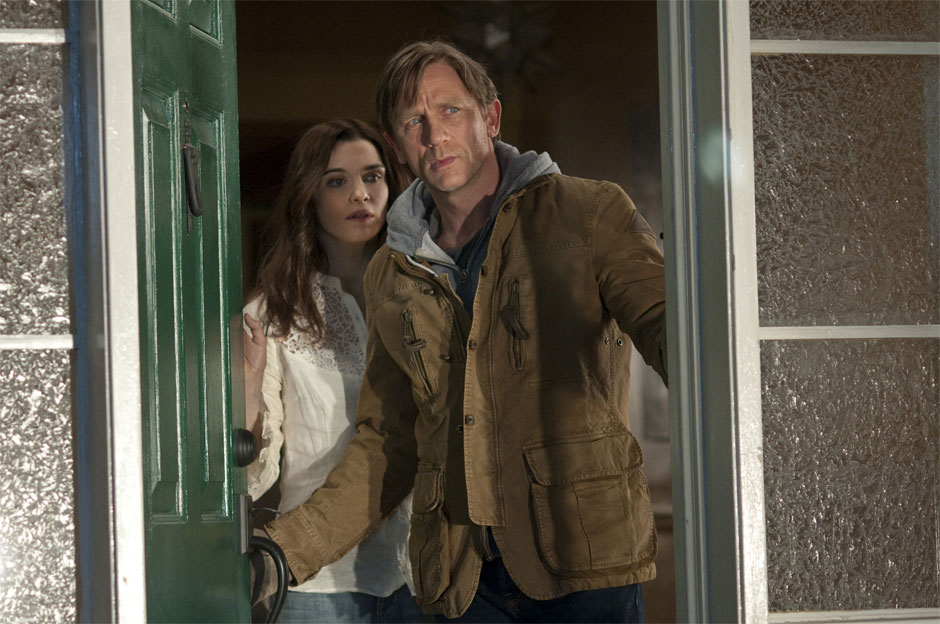Biographical disaster films owe a responsibility to their public and to the world at large. When you make Titanic you have to show who’s at fault and why. It’s part of the historical narrative. Even a fictional recreation requires getting the story right because too many people live in hatred from, for example, an inaccurate belief that Jews killed Jesus. The makers of Deepwater Horizon did a darn good job of castigating British Petroleum for their pivotal role in the worst oil spill in United States history. I wish I could be satisfied with that. But I cannot. And neither should you be.
Deepwater Horizon is a mobile sea-base of oil drilling operations. Technically, the thing is a boat, which I find très cool. Normally, this might make me skeptical of its ability to stabilize a drill 5,000 feet under water, but what could go wrong, really? When Chief Electrical Engineer Mike Williams (Mark Wahlberg) and base Chief Jimmy Harrell (Kurt Russell) –a.k.a. “Mr. Jimmy.” I’m sorry, but it’s impossible to take anybody seriously who goes by “Mr. Jimmy.” — climb onto the Deepwater heliport 43 miles off the coast of Louisiana, they can tell something is wrong already: BP personnel are leaving, but the testing phase hasn’t been finished. Deepwater Horizon, the movie, wanted to make it perfectly clear that the people who run the Deepwater Horizon rig are NOT the ones who drill for oil and are NOT BP affiliated. I’m not sure that exonerates y’all as much as you think it does, but I’m willing to roll with the premise that says BP is the embodiment of pure greed.
The irony of Mr. Jimmy winning a safety award on the very day of the disaster shouldn’t be lost on anybody. And while he is busy reaping the reward, his crew is battling with BP over the definition of a successful Negative Pressure Test (no, I don’t really know what this is, but its misinterpretation was key to the impending explosion). BP wants to go ahead; DH crew are pushing back. It’s hard to know the exact details of this scene on several counts, the foremost being -as I understand it- the BP exec was the only one to survive this particular mini-conflict.
BP’s interests here are represented by two toadies and an unctuous stew of Creole in the human form of John Malkovich, whose local-ese I found difficult to decipher. Some films skimp on the details. The Light Between Oceans, for instance, didn’t bother mentioning it was set in the Southern Hemisphere until a half-hour into the film. Deepwater Horizon went the other way. This film stood up and announced, “I’m set in Louisiana!” with, I’m not kidding, every other shot. The local accents are so thick on screen that the dialogue is often difficult to understand (compounded, of course, by the technical speak and the slang for the technical speak). And when there aren’t accents giving away the location, there are patches and stickers and pelicans galore. It’s a bit overwhelming. The only way this film could be even more Louisianan is if it were set in a replica Superdome erected on Bourbon Street during a Cajun shrimp barbecue competition hosted by Bobby Jindal.
The enjoyment of this film for most will be in the real life heroics of Mike Williams, emerging from trapped under a door after the initial explosion to save lives in dramatic fashion. Anybody who favors real life over Rambo will almost  certainly get a charge out of the heroism of several crew members in the midst of the sea-stranded inferno.
certainly get a charge out of the heroism of several crew members in the midst of the sea-stranded inferno.
Twenty years from now, disaster films are all going to be climate change related. When they are, I fully expect the films to highlight the villains of our time – the architects of obstruction in the face of duty, people like Ted Cruz, Mitch McConnell and especially James Inhofe. Our history and our art requires that when global warming-related disaster happens, it be laid at the doorstep of the people who did their utmost to prevent action. But that’s for future generations. For now, the United States has a modern history replete with oil dependence and conflicts with oil-producing nations. This myopic and suicidal vision is endemic to almost all within our borders, but Deepwater Horizon owed us the vilification of both BP and their enablers, the “DRILL, BABY, DRILL!” crowd, people like Michael Steele and Sarah Palin. The oil is running out, folks, and destroying our environment to squeeze out the last few drops isn’t helping anybody but oil companies and the politicians they grease. Deepwater Horizon had a responsibility to attack both the company that destroyed the ecosystem and the people who encouraged and enabled it. For me, the film’s 50% success rate of condemnation left quite a Gulf.
Gotta love BP corporate sleaze
Can’t see the forest for the trees
In the face of destruction
Is it time for reduction?
“Nah. Just drill off the Florida keys.”
Rated PG-13, 107 Minutes
D: Peter Berg
W: Matthew Michael Carnahan and Matthew Sand
Genre: Assigning blame … and maybe some heroism
Type of person most likely to enjoy this film: People who love real-life heroes
Type of person least likely to enjoy this film: BP executives



